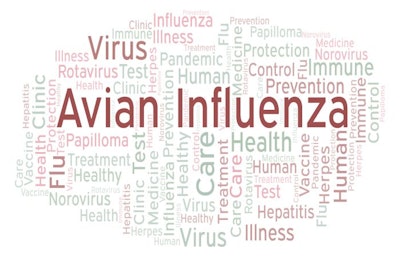
Hungary’s veterinary authority has reported further outbreaks of highly pathogenic avian influenza (HPAI) in poultry.
The latest cases of HPAI in domestic poultry bring Hungary’s total outbreaks over the past two months to 270.
Over the past week, the H5N8 HPAI virus has been detected in three more flocks of unspecified size and type in Hungary. According to Italy’s health authority and research organization for animal health and food safety, all were considered to be secondary outbreaks, and on premises located in the southern county of Bacs-Kiskun.
Hungary’s first outbreaks were reported by the Hungarian veterinary authority in Bacs-Kiskun on March 22 this year. The great majority of the outbreaks have occurred in this county, but the infection spread to neighboring Csongrad within one week, and then further to Bekes by the end of April.
Avian flu situation in Europe
HPAI has been confirmed in poultry in eight European countries so far this year, according to the Animal Disease Notification System of the European Commission (EC).
In its update of May 26, the organization lists a total of 321 HPAI outbreaks in poultry since January 1. Of this total, Hungary accounts for 270, and Poland for 32. Other countries that have reported one or more outbreaks in 2020 are Bulgaria, Czech Republic, Germany, Romania, Slovakia, and Ukraine.
In addition, there have been three outbreaks in European countries in captive birds, as well as three more in wild birds, according to the EC.
From Germany, the federal agriculture ministry reports that the HPAI situation has been “resolved” in the eastern state of Saxony. This was achieved on May 25, according to the official report to the World Organisation for Animal Health (OIE).
The declaration follows a period during which no H5N8 HPAI virus was detected in the region. The most recent positive cases were in captive birds at a zoo in Zwickau on March 24. Previous cases were in Leipzig — in a buzzard found dead, and in a backyard poultry flock in mid-March.
Over the past two weeks, the Germany authorities have made similar declarations of HPAI status in the neighboring state of Saxony-Anhalt, and in Baden Wurttemberg.
Quarantine continues in U.S. turkey flocks
All 11 turkey farms in North Carolina where the H7N3 low-pathogenic avian influenza (LPAI) virus has been detected remain in quarantine, according to the USDA Animal and Plant Health Inspection Service (APHIS). In the past week, the Service has reported to the OIE that cleaning and disinfection have been completed at two of the premises, and are ongoing at the other affected farms in the state.
Quarantine also continues at the only premises in the U.S. where the H7N3 HPAI virus has been detected this year. The controls were put in place after elevated mortality was recorded at a farm with meat turkeys in South Carolina during the first week of April.
Routine active and passive surveillance as well as epidemiological investigations continue in both states, according to APHIS.
Two new human cases of avian influenza in China
Avian influenza A(H9N2) virus has been linked to two new cases of influenza in young children.
According to the Taiwan Centers for Disease Control, the first was a six-year-old boy in China’s Shandong province at the end of April. During the first week of May, the virus was found to be affecting a 10-month-old boy in Fujian province. In both cases, the symptoms were mild, and the children recovered after treatment. They had a history of contact with poultry.
Based on information supplied to the World Health Organization (WHO), these latest cases bring China’s total to five so far this year, and to 33 since the first emergence of the virus in the country in December of 2015.
Following the reports of the new cases, Taiwan News reports that the alert level has been raised for its citizens traveling to the Chinese provinces of Fujian and Shandong.
View our continuing coverage of the global avian influenza situation.


















